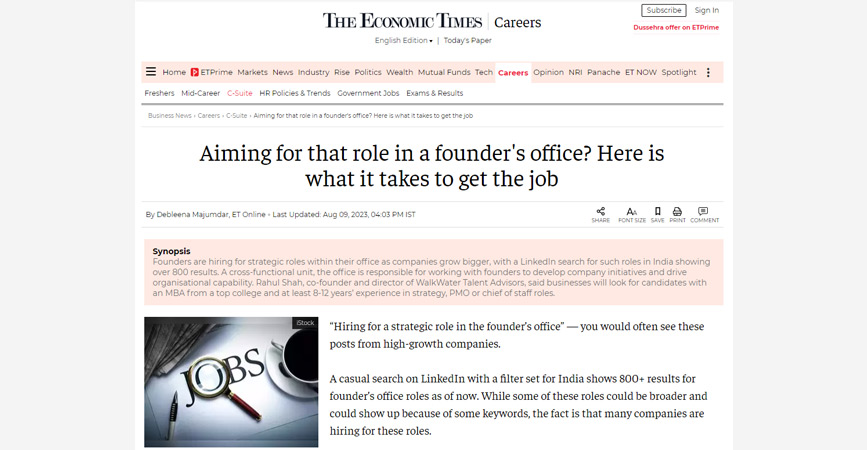
Synopsis
Founders are hiring for strategic roles within their office as companies grow bigger, with a LinkedIn search for such roles in India showing over 800 results. A cross-functional unit, the office is responsible for working with founders to develop company initiatives and drive organisational capability. Rahul Shah, co-founder and director of WalkWater Talent Advisors, said businesses will look for candidates with an MBA from a top college and at least 8-12 years’ experience in strategy, PMO or chief of staff roles.
“Hiring for a strategic role in the founder’s office” — you would often see these posts from high-growth companies.
A casual search on LinkedIn with a filter set for India shows 800+ results for founder’s office roles as of now. While some of these roles could be broader and could show up because of some keywords, the fact is that many companies are hiring for these roles.
What does the role entail and what skills can help people ace this profile?
Let us first understand why these roles are emerging:
As a company grows, it will evolve from being a small, tight-knit team to one that has multiple functions and works from various locations. It becomes difficult for the founders to ensure that timely help is given to each dynamic activity. The founder’s office is one lever to enable this function systematically.
Set up as a cross-functional unit, it is expected to work closely with the founders on strategic initiatives for the company as well as drive organisational capability.
It might mean anchoring the quarterly review discussions across teams one day to planning overall policies for the organisation the next, and ensuring more efficient communication on an ongoing basis while firefighting on issues that need to be addressed urgently.
Rahul Shah, Co-founder and Director, WalkWater Talent Advisors, an executive search and talent advisory firm, says there are some key criteria that companies specifically look for in a candidate applying for the founder’s office role (chief of staff).
In terms of education and experience, Shah says companies look for graduates with an MBA (full time) from a reputed college with 8-12 years of work experience in strategy, PMO or chief of staff roles.
The key functional and behavioural competencies for the role, according to Shah, include:
- Strong business partnering mindset with ability to collaborate and influence without authority
- Comfortable in data-driven decision making, highly analytical and is comfortable with spreadsheets and other analytics tools
- At least 8+ years of work experience in driving outcomes where influence and consensus building are key
- A problem solver who has demonstrated experience of taking initiatives and challenging the status quo
- Great at stakeholder management and able to thoughtfully and constructively challenge the people one works with
- Experience with budget management and comfortable with reading financial statements
- Organised, detail-oriented and thorough
- An excellent communicator and great relationship builder
- Someone with a strong bias for action
- Has a high level of ambition and hunger for creating impact
- Has a hands-on style of working with high result orientation
- Presence and credibility
- High emotional quotient and high intellectual quotient – combination is important
What are the key learnings from this role?
Taking a look at some of the role requirements from problem-solving to stakeholder management and from relationship building to bias for action, what is even more clear is that there could be few dull days in roles like this.
There could be a multitude of different tasks that the person could be expected to deal with, and each of these can bring learning and connections for a lifetime.
What might need to be assessed further?
However, as you decide on interviewing for these roles, given the unstructured nature of the role, it would it be good to ask yourself these questions:
-How would success be measured in a role like this?
-How much time would the founder be able to invest in ensuring you have all the context needed to perform well?
-How would the role be positioned within the organisation to maximise collaboration?
-How structured is the founder (or founders) in their prioritisation of work?
The questions to these answers would be critical to make the assessment. The founder’s office role can be a fascinating learning experience and a true grounding in strategy and operations, but it should not descend into becoming a catch-all role with constant firefighting.
Source: The Economic Times








